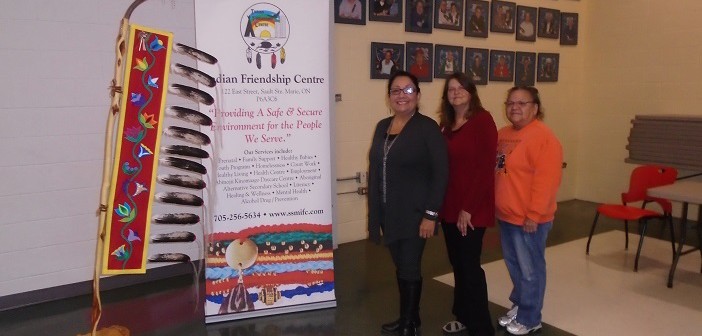For the first time since its inception in 1972, the Sault Ste. Marie Indian Friendship Centre (IFC) is a polling station host site for the 2015 Election. IFC Executive Director, Cathie Syrette, approached Elections Canada this year about the possibility and after meeting various criteria IFC was approved as suitable location to host the vote this Monday.
“We’re pretty proud to be serving the entire community this way,” shared Syrette. “The entire staff will be engaged on voting day to help with ushering, parking and make sure we have finger foods and refreshments available.”
Hosting the vote is just part of IFC’s larger initiative to generate greater participation in the vote among First Nation folks living off reserve in Sault Ste. Marie. According to the National Household Survey in 2011 the Sault’s population was 78,475 with almost 10% of that population represented by indigenous Peoples at 8,290, indicating that a pretty significant portion of the vote in the Sault could be impacted by collective voting through First Nation efforts.
“We want our People to be aware of how important it is to keep up with the Election process and to go and vote,” remarked Syrette. “People are aware that sovereign rights have really been trampled on by a lot of political parties in the past. There was a time with when we couldn’t vote.”
Fifty-five years ago, Prime Minister John Diefenbaker gave non-enfranchised indigenous Peoples the right to vote in Canada. In March of 1960, Diefenbaker pushed voting rights legislation through Parliament and the law took effect on July 1st of that same year. Prior to 1960, indigenous Peoples were required to surrender their status as an ‘Indian’–become enfranchised, to obtain legal Canadian citizenship and voting rights. Becoming an enfranchised indigenous person meant sacrificing rights to reserve lands and other privileges. This was part of the government’s larger plan to assimilate all First Nations into Euro-Canadian society.
Memory is long enough and for people that recall a time when they were not allowed to vote the desire to participate in what is now a right is still tainted bitter.
“The Elders are our indigenous population in the community that refuse to vote,” stated Syrette. “It all stems from a very historical point of view. For whatever reason- they were not allowed to vote and they carry that with them. And here we are as their grown children saying ‘yes you can vote, yes you should vote and yes your voice matters’.”
Lynn Leclair is a former Board member and current volunteer with IFC. “It is significant to say that we need across the country- change. And we need it now. We’ve had two leading parties in this country for years and nothing feels like it changes. It seems we go around in a circle all of the time. This is a critical election for everybody.”
IFC is the largest organization that provides services to urban indigenous Peoples in the Sault. However, the organization has an open door policy for all members of the community and this year’s election events have been offered to the broader community of Sault Ste. Marie as well as First Nation communities on reserve. This year IFC has been active in registering folks that want to vote, representing concerns during community election events and hosting election information sessions.
“We invited a rep from Elections Canada to speak with us about rule changes for the 2015 Election and this week we hosted an event for our local candidates to speak about concerns within our community,” commented Leclair.
The event was attended by about 30 individuals and local candidates from the Green party and NDP party were able to participate on relatively short notice.
IFC has been vocal in their calls to increase voting among indigenous Peoples. “We’re really trying to support an understanding of the Federal political parliamentary system in Canada and the importance of the election for Friendship Centres in Ontario,” commented Syrette.
Nationally issues around education, poverty and youth, clean drinking water, the disproportionate representation of indigenous Peoples in prison and a call for inquiries into 1200 missing indigenous women are raising the voices of First Nations People. Locally, some concerns expressed by the Sault’s urban indigenous Peoples include: a need to increase help for single income homes -particularly those on fixed incomes; a decrease in the ongoing interference in the lives of indigenous families from government services such as the Children’s Aid Society of Algoma; and an end to the dysfunction within the Court System that perpetuates what many indigenous Peoples would express as ‘systemic abuse’ of children and families.
“We just want to encourage everyone to vote- our indigenous Peoples and the entire community,” remarked Syrette. “Regardless of the outcome I would really like to focus on relationship building, being positive and move forward. Friendship Centres servicing urban indigenous Peoples are not an expenditure. They are an investment.”
(feature image courtesy of Margaret Boyer. Left to right, Cathie Syrette -IFC Executive Director, Lynn Leclair -former board member and volunteer, Mable Lewis Hill -former board member and volunteer)


